Online reviews are a powerful deciding factor for consumers. Just like search engines rely on local backlinks as a local SEO ranking factor, people rely on local online reviews to determine whether a business will offer products or services that will satisfy their expectations.
Sites like Google, Yelp, Tripadvisor, and Facebook contain loads of consumer-generated reviews. And as time goes by, more people post reviews on these sites.
People today validate their purchase decisions based on these reviews. These reviews give them confidence when they decide to pay for a product or service.
In this article, as we have previously with local SEO statistics, we’ll discuss the top 10 Google review statistics you need to know.
1. 89% of users read online reviews before buying the product (Source)
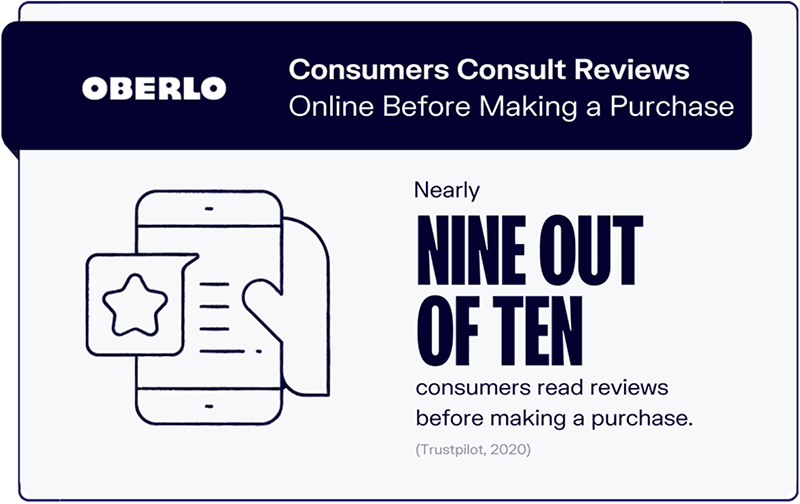
This stat tells us why reviews are so important. According to a survey by Trustpilot, nearly 9 out of 10 consumers look for reviews before they buy anything. Of these, about 90% are women, and 81% are men.
Reviews strongly influence a consumer’s purchase journey. This also indicates that most buyers trust what other consumers say about the product they wish to buy. Consumers want to learn about others’ experiences, and both positive and negative reviews help them confidently make a purchase decision.
2. 93% of users have made buying decisions based on an online review (Source)
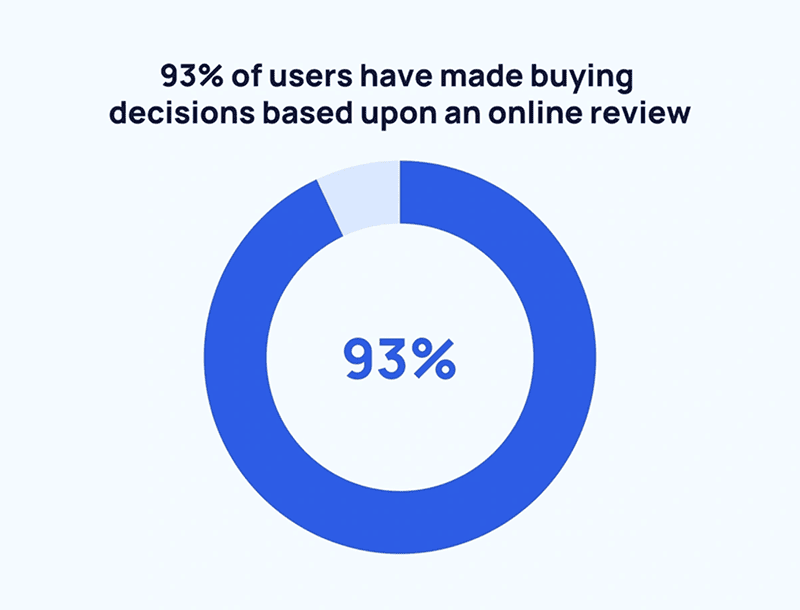
Reviews affect the purchase decision of about 93% of consumers. According to research by Podium, consumers tend to engage with businesses that have at least a 3.3 star rating (out of 5). Consumers’ tendency to purchase from businesses with a reliable star rating shows how important it is for companies to focus on getting good reviews and ratings.
Podium’s research also found that 68% of consumers say they’re willing to pay up to 15% more for the same thing if they can have a better customer experience. So, in most cases quality wins over price. Most consumers value a good experience more than anything else.
3. Only 9% of consumers would consider engaging with a business that had a 1- or 2-star average rating (Source)
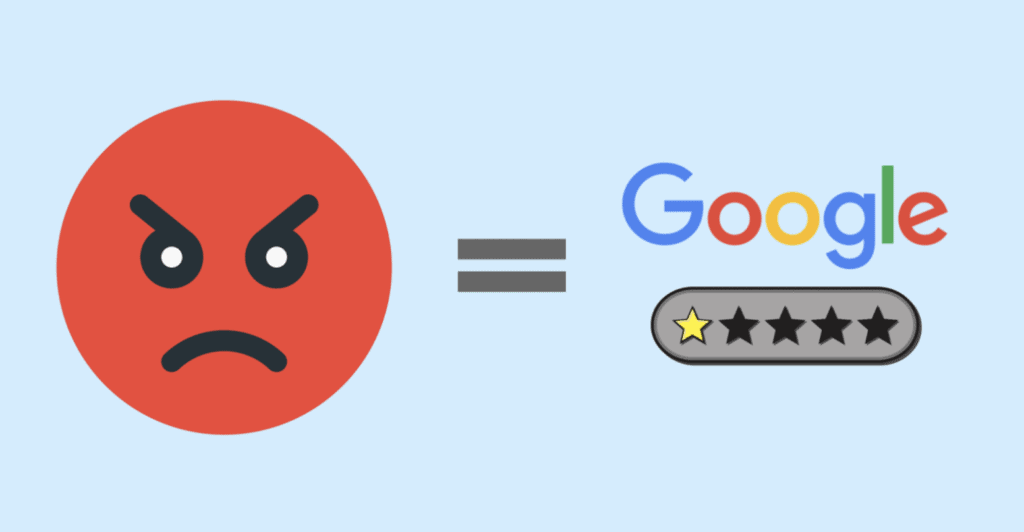
Businesses with lower star ratings are less likely to receive customer orders, according to research by Podium. It may not be surprising that low ratings negatively affect businesses, but this shows how few potential customers would be willing to give such a business a chance.
While some bad reviews may be unavoidable, focusing on offering a better customer experience can help your business achieve higher ratings.
Consumers trust reviews that feel authentic. Reviews with slightly imperfect scores tend to seem more “real” to consumers than a 5-star rating, as those can feel “fake.” According to Podium, more than 50% of consumers said that reviews with imperfect scores seemed more authentic. Most consumers (6 out of 10) say they study further when they see a product with only 5 star ratings or perfect reviews.
4. Over 60% of consumers are likely to leave a review if the business asks for one (Source)
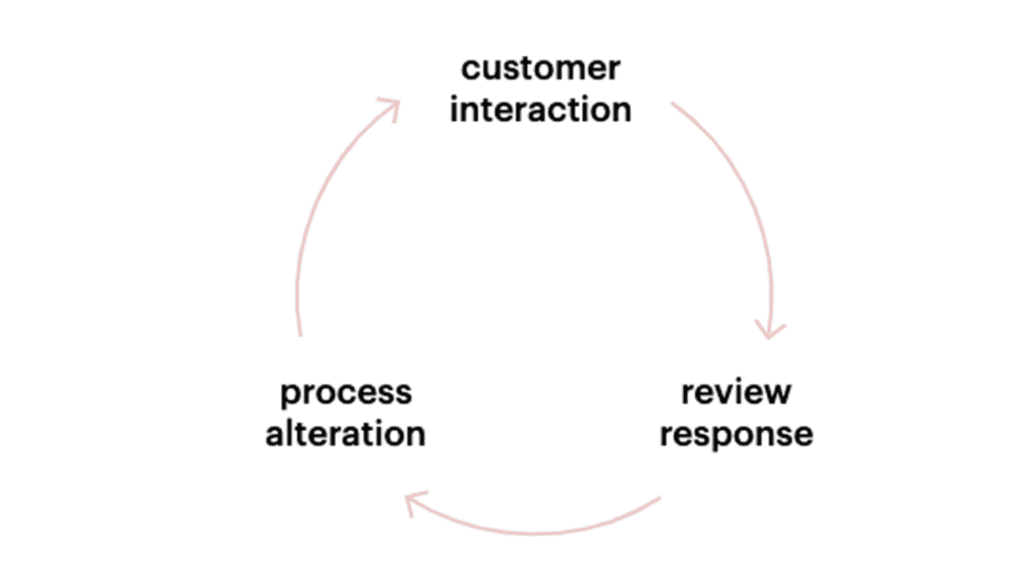
It’s important to follow up with customers after a purchase to ask for a review, as both positive and negative feedback is helpful. While positive reviews help build your online reputation, negative reviews help you improve your products or services.
Even a negative review—if you respond to it in a professional, productive, and humble way—can improve your reputation because it shows Google users that you’re willing to resolve issues and do what it takes to improve customer experience. And if you properly address a negative review, you can turn a dissatisfied customer into a loyal one.
It may be surprising that more than half of customers will be happy to leave you a review if asked, and this is extremely valuable for your business. So don’t be shy asking customers to leave a review about their experience. You can send them a follow-up email with a link a few days after the sale, call or text them, or hand them a card with a QR code at the point of purchase.
Since negative reviews help make your Google Business Profile more credible, don’t stop asking for reviews even if you’re getting some negative ones.
5. Google hosts 73% of all online reviews for businesses (Source)

A ReviewTracker analysis found that the four top review sites host 88% of all online reviews. These include Google with 73%, Yelp with 6%, Facebook with 3%, and Tripadvisor with 3%.
While it may be tempting to create profiles on as many sites as possible to drive up your number of reviews, it’s better to focus your attention on getting as many reviews as you can on these four sites. Claiming listings on these top directories not only will help customers find your business, but they’ll also boost your rankings in the search engine results pages (SERPS).
6. Only 24% of businesses always respond to negative reviews (Source)
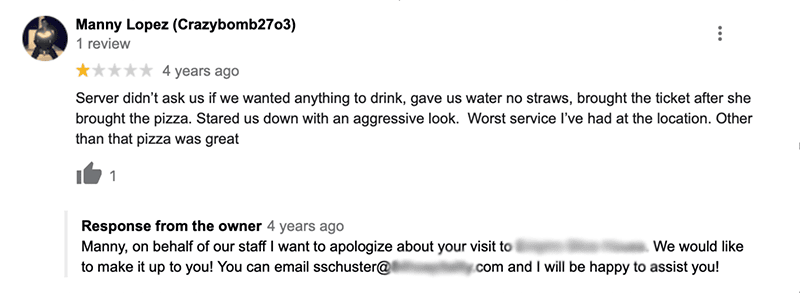
Good or bad, you must respond to customer reviews—especially the negative ones. By responding to bad reviews, you can gain information that will help you improve your products, services, and processes. If done with tact, patience, and professionalism, responding to negative reviews publicly shows Google users that you care about customer experience and correcting any issues that may have occurred.
The fact that less than a quarter of businesses consistently respond to negative reviews can give you a competitive advantage. Find out what went wrong with your customers. Even if you feel frustrated, try your best to learn about their issues and resolve their problems.
All businesses get bad reviews and criticism. But when you respond to bad reviews and your competitors don’t, you get the opportunity to come out looking better.
7. 28% of consumers say they have looked up a business’s reviews while standing or parked right outside the building (Source)
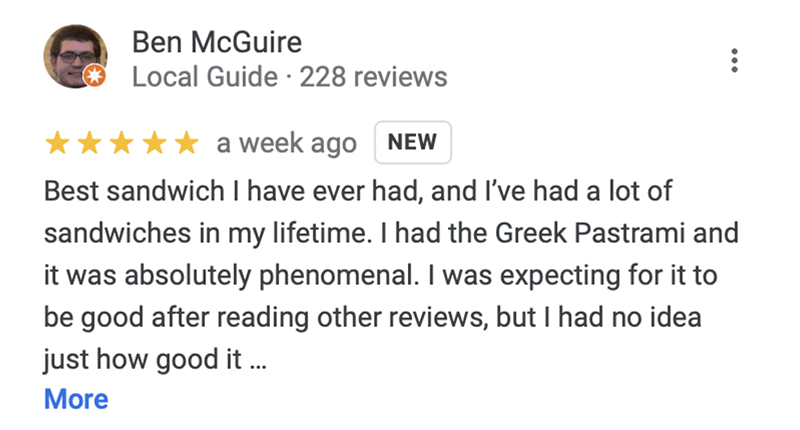
According to research by Podium, brick-and-mortar businesses could lose 28% of their customers by neglecting their online reviews.
If the potential customer has made it all the way to the business’s doorstep, losing them due to a lack of reviews or not responding correctly to negative reviews would be an avoidable missed opportunity. A salesperson won’t get the chance to convert the visitor into a customer if the prospect decides not to go inside.
So, Google reviews are essential, especially for small or medium sized businesses, and it’s important to take them seriously.
8. Consumer use of Google to evaluate local businesses leaped from 63% in 2020 to 81% in 2021 (Source)
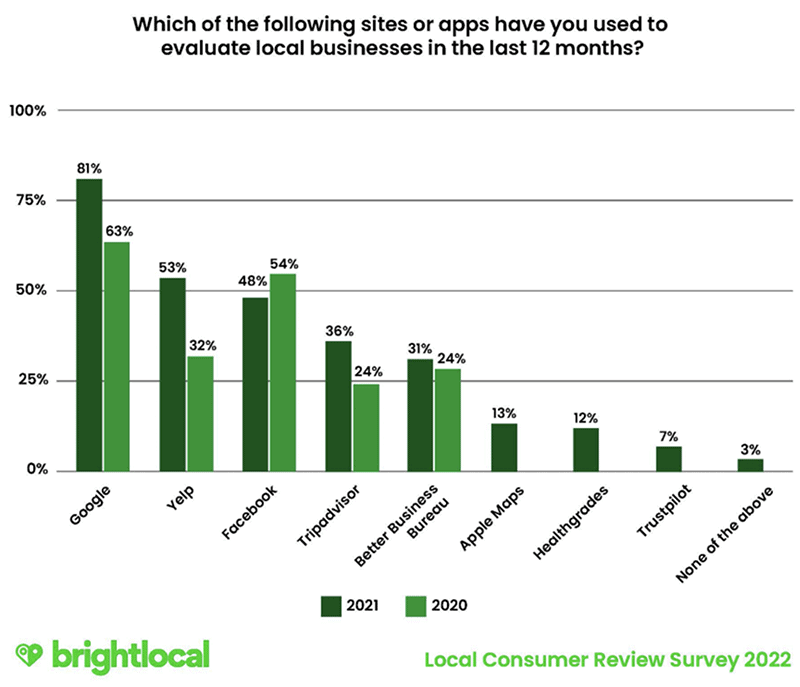
For local businesses, Google is the most popular source by far for potential customers to find information about local businesses. In just one year, Google experienced an increase of 63% to 81% of consumers using their platform to search for reviews.
Yelp also saw a significant increase between these two years. In 2021, about 53% of consumers evaluated local businesses on Yelp, which was a steep climb from 32% in 2020. On the other hand, consumers using Facebook for this purpose dropped from 54% to 48%.
9. 63.6% of consumers say they are likely to check Google reviews before visiting a business location (Source)
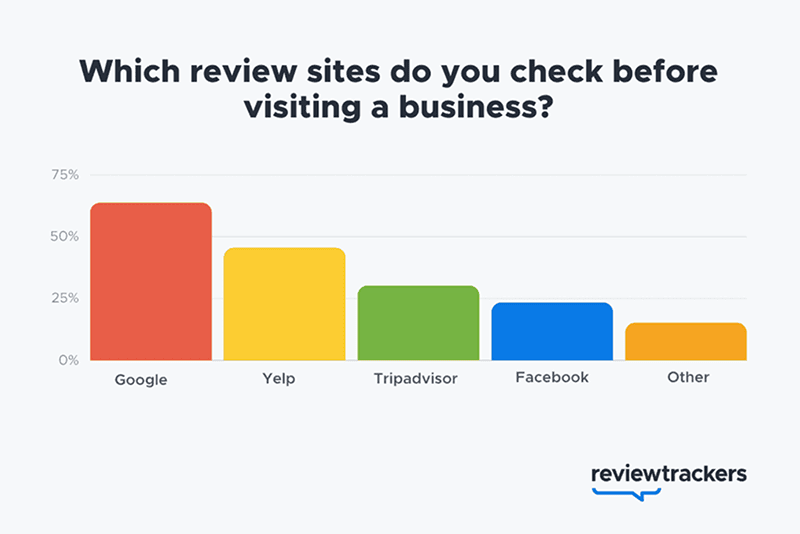
Nearly two out of three of consumers say they would check reviews on Google Maps or Search before visiting a business location, making Google the most popular source for business reviews.
By contrast, fewer than half of survey respondents said they would check Yelp, little more than a quarter would check Tripadvisor, and fewer than 25% would check Facebook or another platform.
Searching for information about businesses becomes easier with Google’s “zero-click” searches. The zero-click search feature allows users to discover a business on Google’s organic search pages, giving them answers to their queries without having to click on a website. This gives Google an edge over other review sites, and zero-click searches increased by 65% in 2020.
10. 50% of consumers are confident that they’ve seen a fake review on Google (Source)
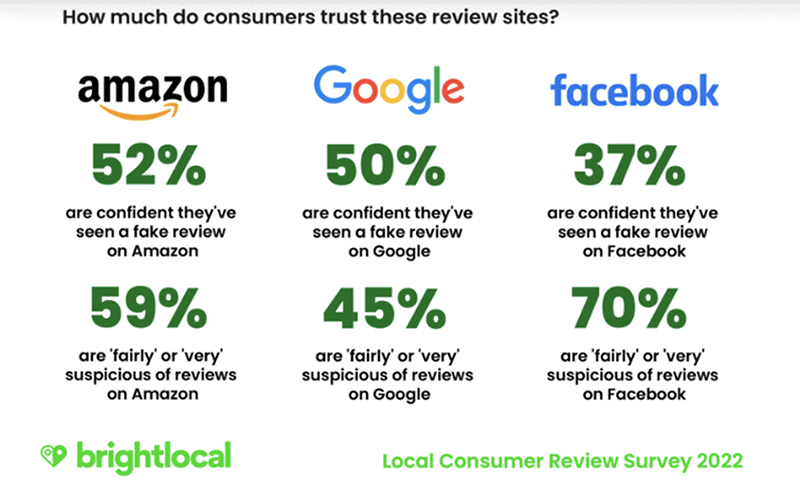
Some businesses post fake reviews to manipulate their ratings and reputation. A BrightLocal study says that about 50% of consumers believe they’ve seen fake reviews on Google when researching a local business.
According to the study, respondents reported three main things that will cause them to suspect an online review is fake:
- Over-the-top praise (45%)
- Many reviews with “similar content” (40%)
- Posted by an anonymous user or a user with an obvious pseudonym (38%)
It’s important for businesses to maintain transparency and refrain from posting inauthentic or manipulative reviews. Improving the customer experience will encourage happy customers to leave authentic reviews and make personal recommendations.
How to start getting more Google reviews
Want to get more Google reviews for your business? Buying reviews online might seem easier and faster than waiting for authentic reviews to build up naturally. However, customers can often spot dishonest attempts, and you might lose your credibility with them forever.
Even if you have few reviews or none at all, or too many bad reviews, never buy them. Buying Google reviews is against their guidelines. And if you’re discovered using false advertising, your account can get shut down completely.
The best way to get Google reviews is by asking customers to leave a review online. Requesting reviews might feel awkward and slow, but it’s the best way to get more Google reviews authentically.
What to do when you get a negative review
No business can satisfy all of its customers. Some will be dissatisfied and leave a negative review. Also, competitors may try to harm your reputation by leaving fake negative reviews. When you get a negative review, don’t get disheartened and leave it like that. Do whatever you can to resolve the situation.
Here are a few things you can do when someone leaves a negative review about your business.
Respond promptly
Never leave reviews unanswered, and respond quickly. When users see negative reviews without any response from you, they’ll draw conclusions. Responding to negative reviews allows you to show potential customers that you care about the quality of your products and services and improving customer experience. In some cases, it also gives you a chance to give your side of the story in a tactful, positive way.
Personalize your response
Respond with care, even if you’re trying to post it as quickly as possible. Refer to the reviewer by name and mention the product they wrote about. Never ever make your response seem like a finger-pointing battle. Your answer shouldn’t sound like a debate. Always apologize for their bad experience and if applicable offer to resolve the issue. This shows other users reading the exchange that you’re empathetic and willing to do what it takes to make things right.
Take the conversation private
After your public response to the negative review, take the conversation to a private channel. You can move the conversation offline by inviting the reviewer to call customer support, or you can give them an email address where the discussion can continue privately. Show them you’re ready to offer everything necessary to resolve the issue or improve their experience. If all goes well, they might change their review or remove it in the end.
Offer a solution
Simply responding to bad reviews with empathy isn’t enough. Offer reviewers a clear solution to the situation. This can be a voucher for a free product or service, replacement of a faulty item, or an offer for a special perk if they’ll return to your business. If the customer sees that you’re putting effort into solving their issues, their opinion of your business can improve drastically.
Your brand reputation depends on how you handle negative reviews. Responding to and resolving negative reviews reduces customer churn. If you do it well, many dissatisfied customers might turn into loyal brand ambassadors in the long run.
Optimize your Google Business Profile
There are many things you can do to improve your Google Business Profile, like citation management, website management for SEO, review outreach and management, and local link building. Making local SEO improvements will boost your local rankings and help you get found by the right people. Or you can enlist our local SEO services and let us do it for you.
